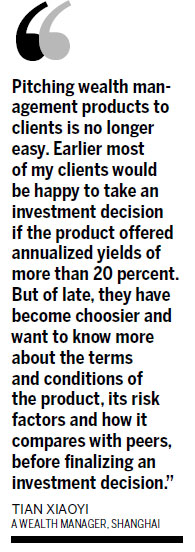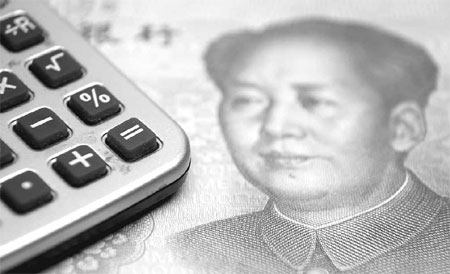Investment patterns alter with times
Updated: 2013-04-22 07:14
By Wu Yiyao in Shanghai (China Daily)
|
||||||||
|
Most of the Chinese investors believe that it is an opportune time to invest in precious metals, insurance and annuities, according to a survey conducted by Canadian financial services provider Manulife. Provided to China Daily |

Long-term yields, not quick returns is priority for investors, says Survey
Times are changing and so are the Chinese investors. Stable instruments with long-term yields have stolen a march over the once preferred fast-money products, thereby raising the stakes for wealth managers.
Tian Xiaoyi, a wealth manager from Shanghai is one of the wealth mangers in China who is both happy and perplexed with the shifting consumer preferences.
"Pitching wealth management products to clients is no longer easy. Earlier most of my clients would be happy to take an investment decision if the product offered annualized yields of more than 20 percent. But of late, they have become choosier and want to know more about the terms and conditions of the product, its risk factors and how it compares with peers, before finalizing an investment decision," said Tian.
Yield is no longer the priority and the focus is more on stability and low risk, he said. What this means is that wealth management professionals need to be more market savvy and equipped with professional knowledge to hard sell a variety of products, with assured, stable returns he said
According to a survey conducted by Canadian financial services provider, Manulife, investor sentiment in China, as measured through the responses of over 500 investors across Beijing, Shanghai and Guangzhou, has veered more to low-risk instruments like fixed income, gold and real estate, especially first residences.
The report, based on responses from investors across all age groups, says that those aged between 25 and 29 are more inclined towards fixed income and first home investments. Most of them feel that current market conditions are favorable and attractive for entry-level investors.
Nearly 56 percent of the respondents identified deposits as the best way to achieve financial goals, while lower costs and hard work were additional factors at 38 percent and 30 percent respectively. Fixed income still remains the most preferred asset class, particularly for investors aged between 50 and 59.
Most of the Chinese investors believe that it is an opportune time to invest in precious metals, insurance and annuities, the survey said.
"For most of the investors, the key financial priority is to support their children's education. Hence their investment actions would be guided by income stability rather than volatility and risks," said Liu Qingshan, general manager of Manulife-Teda Fund Management.
"Investors, especially the middle-class ones with clear goals for wealth management, need stable, long-term and healthy growth in assets," said Li Huihui, general manager for the personal sector in China at the Singapore-based OCBC Bank.
Most of clients for personal banking services are young, well-educated, with good education background and have sharp personal attitudes in investment strategies, which require tailor-made, diversified and holistic investment financial services, said Li.
In many mature markets, investment is all about focusing on growth values rather than speculation, said Zhu Jingzhi, a Shanghai-based investor.
"Investment motives have changed in the last 10 years. Earlier investment decisions were largely based on the internal information that was circulated through gossips. In most cases, even if the investor knew nothing about the company or the shares, it was possible to make money," said Zhu.
Such trends have disappeared and it is important for investors to be more responsible with their investment choices, he said.
Most of the investors are keen on creative financial products as it helps expands wealth and achieve financial goals like children's overseas education, foreign holidays, to enjoy a life of high quality after retirement, to have enough measures to secure against risks including diseases and accidents, said Li from OCBC Bank.
It is not surprising that wealth management consultants are feeling the pressure, as professionals need better insight to remain and succeed in their positions, said Zhou Lin, wealth manager with Shanghai Pudong Development Bank.
"The choices for Chinese investors in the domestic financial market is limited, when compared to overseas markets, due to the strict regulations, and the need for financial products to stay within the prescribed limits," said Thomas Luk, a London-based wealth management consultant.
Some investors, however, find reliable agents to invest in overseas markets through the QDII program at the current stage, as a supplement to their choices in domestic market.
"I think that as a more liberalized market emerges in China, both investors and wealth managers will applaud a much wider range of choices to cater to specific needs," said Luk.
wuyiyao@chinadaily.com.cn
(China Daily 04/22/2013 page16)

 Obama celebrates young inventors at science fair
Obama celebrates young inventors at science fair
 Earth Day marked around the world
Earth Day marked around the world
 Volunteer team helping students find sense of normalcy
Volunteer team helping students find sense of normalcy
 Ethnic groups quick to join rescue efforts
Ethnic groups quick to join rescue efforts
 Earthquake leaves family shattered
Earthquake leaves family shattered
 Boston Marathon bombing suspect charged
Boston Marathon bombing suspect charged
 Chasing vestiges of the Great Wall
Chasing vestiges of the Great Wall
 Weekly Photos: April 15-21
Weekly Photos: April 15-21
Most Viewed
Editor's Picks

|

|

|

|

|

|
Today's Top News
Russia criticizes US reports on human rights
China 'aims to share its dream with world'
Chinese president appoints 5 new ambassadors
Nation's IPR suits see spike in 2012
H7N9 not spread between humans: WHO
Health new priority for quake zone
Sino-US shared interests emphasized
China, ROK criticize visits to shrine
US Weekly

|

|







